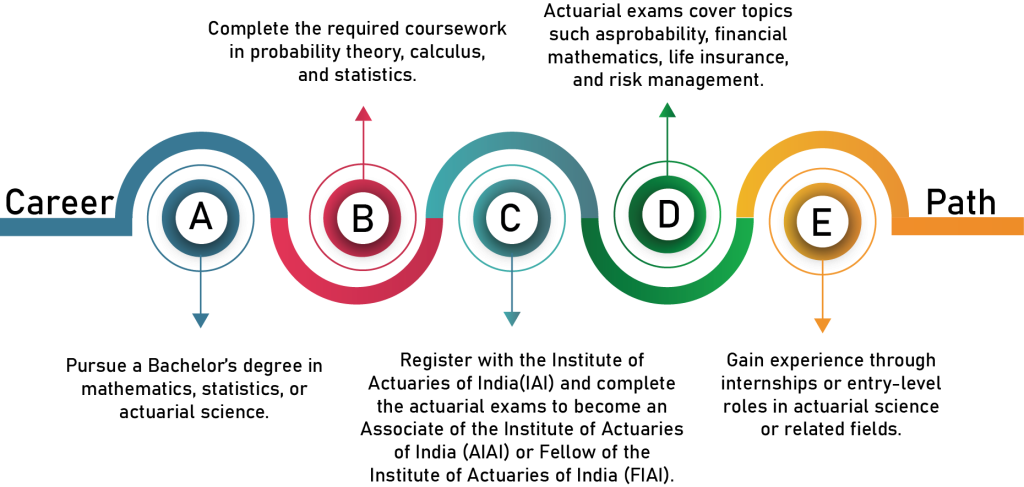Actuarial science. is a discipline that uses mathematical and statistical methods to evaluate, manage, and mitigate risks in financial and insurance industries. Actuaries apply their expertise in probability theory, economics, finance, and computer programming to design and analyze insurance policies, pension plans, and other financial products. They also use data analysis and modeling techniques to assess the financial impact of future events, such as natural disasters, medical trends, and market fluctuations. Actuaries are highly skilled professionals who play a critical role in ensuring the financial security and stability of individuals, businesses, and governments.

Work description
The work of an actuary involves analyzing financial risks and uncertainties in various situations using mathematical models, statistics, and financial theory.
Actuaries work in industries such as insurance, finance, healthcare, and government to design insurance and pension plans, evaluate financial risks associated with events like natural disasters, accidents, or illnesses, and make informed decisions about how to manage these risks.
Actuaries must have strong mathematical and statistical skills, as well as the ability to communicate complex information to non-technical stakeholders. They may also be required to hold professional certifications, such as the Associate or Fellow of the Society of Actuaries (ASA/FSA) or the Chartered Enterprise Risk Actuary (CERA).
High earning
High earning potential.
Lucrative salaries
Strong job security.
Opportunities for innovation
Opportunity to work in a variety of industries.
Versatility
Work on challenging and intellectually stimulating projects.
Flexibility
Opportunities for professional development and advancement.
Job satisfaction
Prestigious professional certifications available.
High stress
The fast-paced and constantly evolving nature of the field can create high stress levels, especially when working on complex projects with tight deadlines.
Long hours
Computer engineers may be required to work long hours, especially during critical project phases or when troubleshooting issues.
Competitive field
Due to the high demand for computer engineering jobs, the field can be highly competitive, requiring candidates to have specialized skills and experience.
Constant learning
Computer engineers must constantly stay up-to-date with the latest technologies and advancements in the field, which requires ongoing learning and professional development.
Isolation
Depending on the job and work environment, computer engineers may spend a lot of time working independently or in small teams, which may not be suitable for everyone.
Eye strain and other physical health issues
Staring at computer screens for long periods of time can cause eye strain and other physical health issues, such as back pain and repetitive strain injuries.
The cost of pursuing a career in actuarial science in India can range from Rs. 2-5 lakhs, depending on the individual’s educational background, study materials, professional memberships, and other expenses.
The cost of a Bachelor’s or Master’s degree in mathematics, statistics, or actuarial science can vary from Rs. 1-5 lakhs.
Actuarial science courses and professional certification exams offered by the Institute of Actuaries of India (IAI) can cost up to Rs. 50,000 per exam.
Study materials, textbooks, and other resources for actuarial exams can cost between Rs. 20,000-50,000.
Membership fees for professional organizations such as the Institute of Actuaries of India (IAI) can cost up to Rs. 10,000 per year.
Other expenses such as transportation, accommodation, and living expenses may vary depending on the location and individual circumstances.
[wpcharts type=”horizontalbarchart” bgcolor=”red:gray:yellow,blue:gray:yellow,random:gray:yellow,purple:gray:yellow” min=”0″ legend=”true” titles=”2 year , 5 year” values=”3,7,5,12″]
The earning potential for actuaries in India varies depending on factors such as education, experience, industry, and location.
Entry-level actuarial analysts can earn around Rs. 4-6 lakhs per annum.
As actuaries gain experience and move up the career ladder, they can earn salaries ranging from Rs. 10-20 lakhs per annum or higher.
Experienced and qualified actuaries in senior management positions or as chief actuaries can earn more than Rs. 50 lakhs per annum.
The insurance industry is one of the highest-paying industries for actuaries in India, with salaries ranging from Rs. 10-20 lakhs per annum for entry-level roles and up to Rs. 50 lakhs per annum for experienced actuaries in senior management positions.
Actuaries working in the banking and finance industries also have high earning potential, with salaries ranging from Rs. 10-25 lakhs per annum.
The earning potential for actuaries in other industries such as healthcare, government, and consulting may vary depending on the specific organization and job role.
[wpcharts type=”horizontalbarchart” bgcolor=”red:gray:yellow,blue:gray:yellow,random:gray:yellow,purple:gray:yellow” min=”0″ legend=”false” titles=”Entry-Level, Mid-Career, Senior-Level ” values=”5,15,25,35,45,55″]
Strong foundation in mathematics, statistics, and computer programming.
Excellent analytical and problem-solving skills.
Ability to work independently and as part of a team.
Willingness to continuously learn and develop professionally.
Good communication and teamwork skills
Strong work ethic and time management skills.
Weakness in mathematics and statistics.
Poor attention to detail and accuracy.
Inability to work under pressure and meet tight deadlines.
Poor communication and interpersonal skills.
Lack of motivation or willingness to learn and develop professionally.
Inability to manage time effectively and prioritize tasks.
Lack of interest or passion for the field of actuarial science.
Work-life balance
The work-life balance for actuaries can vary depending on the employer, job role, and individual circumstances.
Actuaries typically work standard office hours, but may be required to work overtime or irregular hours to meet deadlines.
The workload may vary depending on the season or projects, which can affect the work-life balance.
Remote work opportunities for actuaries have increased in recent years, which can provide more flexibility and better work-life balance.
However, remote work may require additional self-discipline and time management skills to balance work and personal responsibilities.
The work culture and policies of the employer can have a significant impact on the work-life balance.
Some employers may have flexible working hours, work from home options, or other benefits that support work-life balance.

Actuaries play a crucial role in assessing and managing financial risks for individuals, organizations, and governments, which helps to promote financial stability.
Actuaries help design insurance policies and pension plans that provide financial protection for individuals and promote social welfare.
Actuaries use data and statistical analysis to develop new insurance and financial products that meet evolving consumer needs and promote innovation.
Actuaries have excellent career growth opportunities, with high demand for their specialized skills and expertise across various industries.
Actuaries have the potential for high earning potential, especially with experience and additional certifications.
Actuarial science is a global field, and actuaries can find job opportunities in various countries, which provides opportunities for cultural exchange and personal growth.
Life insurance Machine Learning
Involves analyzing and managing risks associated with life insurance policies and products.
General insurance
Involves analyzing and managing risks associated with general insurance policies and products such as motor, property, and liability insurance.
Software Engineering
Involves designing, developing, and maintaining software applications and systems.
Investmen
Involves analyzing and managing risks associated with health insurance policies and products.
Enterprise risk management
Involves analyzing and managing risks associated with the overall operations of an organization, including financial, operational, and strategic risks.



